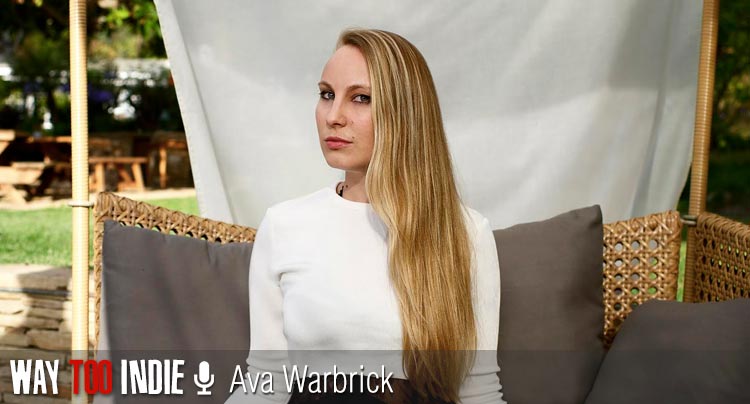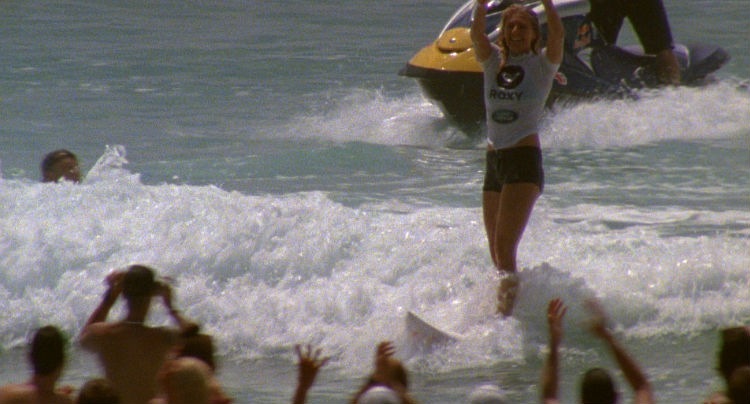Surf Porn, Heartbreak, and Redemption Collide in ‘Stephanie in the Water’

At the age of 17, Australian professional surfer Stephanie Gilmore won her first world championship, and would go on to rack up three more in a row in her first four years on tour, a record for both males and females in the sport. Unlike most professional surfers, Stephanie never took a warm-up ride on the waves before her competitions (even if they were for a world title), but she still made her wins look easy, as if she was born to dominate the sport. Her string of success was cut short in December 2010, however, when she was violently attacked outside her home.
More narratively and emotionally driven than most surf docs (though it does boast plenty of gorgeous surf footage), Stephanie in the Water follows Gilmore’s rise to being the best in the world, the traumatic effects of the attack that broke her winning streak, and her road to recapturing her former glory.
We chatted with director Ava Warbrick about the film, which is out today on iTunes. Visit stephanieinthewater.com for more info.

How’s the reaction to the film been on the festival circuit over the past year?
Ava: It’s been really enthusiastic and great. It’s interesting to see the difference in reaction between a surf audience, who are really accustomed to watching a lot of action footage in a surf movie, and the more critical eye of a film audience. The response has been good on both sides, so I’m quite happy. The surf audience is surprised that there’s a little more narrative than surf porn, as we like to say. [laughs]
I like how much surf porn you do show. I used to watch a lot of those videos as a kid, and the footage you have here is really pretty.
Ava: The first ten minutes of the movie, I think we do a lot of information catch-up. We have that little television clip and show who she was around when I met her. We cover the questions journalists like to ask her, like “What’s it like to win?” and “Are you being compared to boys?” We start unpacking those things more elegantly when we move into our language, which is 16mm. I think that’s when the film opens up.
I want to touch on the 16mm thing in just a minute, but first, I want to ask you about something Stephanie says in the early portion of the film. She views free surfing as a creative experience. I’d never looked at it that way, and it was a pretty eye-opening statement for me.
Ava: I really enjoyed that comparison she made. I surf a very small amount. It’s not my manifestation of creativity, but I can imagine what it’s like to have that creative outlet. When she said it to me, I felt like I could finally relate. She does this thing in which there’s money involved, it’s competitive, and she’s a natural, but when she says free surfing is a creative experience, it made it really fun and relatable for me. It was fun imagery to play with.
Do you find free surfing to be a creative outlet for you?
Ava: For me? Not at all. [laughs] For me, it’s something that I tried to do but never felt really good at. I grew up around surfing my entire life. I grew up in Australia in the surf industry, since my father is an avid surfer and part of the industry as well. I never connected with it on a created level; I just paddle around on the waves. [laughs] To work with someone who has that immediate connection with it was great. Making a movie about surfing was a way for me to bring my creativity to the same subject.
You met Stephanie through your father, correct?
Ava: That’s correct. He started a surf company in Australia years ago, and so that’s how he knew Stephanie.
There’s a fascinating scene in the film in which Stephanie contemplates why we as human beings want to be the best in the world.
Ava: That was really wonderful. I remember asking her something along the lines of, “What’s it like to have people and this competition structure tell you you’re the best?” The way she describes it is really interesting. There is no physical change. Nothing actually changes. It’s this outside entity telling you you’re the best, and she’s looking for new motivation, a new way to approach it to understand it. I was curious about that, because I’m not the best in the world at anything! [laughs] There’s no one telling me that. What you don’t see on camera is what she said to me, which was, “Haven’t you ever wanted to be the best?” I don’t know if I have that same drive, so that’s why I think she’s such a fascinating person.
I love that she questions her own nature.
Ava: It’s something I’m curious about, too. Why athletes strive to be number 1.
There’s another scene where Stephanie is participating in a panel with her rival, Carissa Moore. When Carissa starts speaking, you zoom in on Stephanie instead of her, which I thought was great. We can see how riled up she’s getting.
Ava: It was an experimental thing to shoot, because we were shooting on 16mm. We had to make very hard choices about what we shot at any given time. It’s crazy to shoot a documentary on 16mm, because you don’t have the luxury of shooting everything. That was the first event she did after not winning the world title for the first time in her life. She’s back to square one, and I wanted to get a read on what she was feeling. That was a moment for Stephanie when she was under the eye of the entire industry, so we wanted to make sure we captured that.
I think the constraints of shooting on 16mm helped you there. In other docs, we’d see a shot of Carissa, then a shot of Stephanie. Then Carissa, and back to Stephanie. I think by staying with Stephanie, we really get a sense of the awkward, frustrated energy she was feeling.
Ava: I appreciate a quiet form of filmmaking, and the material informed that. The constraints helped.
The separation between Stephanie and the rest of the slightly younger female surfers seems to be a little awkward, at least from what we see in the film. We see the other girls walking arm in arm at an event, while Stephanie signs autographs alone. Is that tension palpable in person?
Ava: It’s an interesting dynamic with the surfers on tour. It’s a very small group of women, only 17 of them. They’re all very close with one another, but I will say that I’ve noticed Stephanie keeping to herself a lot, although she’s close with a lot of those girls. She travels with her own group of friends and her sister, and she does her own thing.
The film looks great in 16mm.
Ava: It was a great experience shooting like that. One of the reasons we chose to do that was that a lot of old surf movies I watched as a kid were shot on 16mm. I wanted to make reference to that. I watched The Search films which were made in the ’90s by Sonny Miller, who unfortunately passed away a couple weeks ago. He shot on 16mm, and I loved those movies. Another reason is that my DP, Jesse Cain, loves working with 16mm, too.
Did the attack on Stephanie happen during production?
Ava: It did. We were shooting with Stephanie, following her competition life and trying to unpack some of those themes of being a female athlete, being in the public eye…those kinds of things. We shot for a long time, and I saw a lot of personal change within her, but the attack was the critical event that had a real effect on her.
Was it difficult to approach her for that interview?
Ava: It wasn’t difficult to approach her, but I didn’t know how she’d respond. We were very close, so she was very comfortable to talk to me, and it felt like she really wanted to.
Clearly, some unexpected things happened during the production. How different is the end product from your vision going into the project, or were you open to anything happening?
Ava: I didn’t know what we were going to end up with. I had some ideas, and I had some things that I wanted to explore. However, I didn’t know what to expect. This was my first documentary feature. I had a feeling that there would be unexpected turns, and you just hope somehow you can pull something together that’s authentic and can sort of say something. I’m happy with how it turned out.
Finally, I just wanted to mention the score, which I think sets the tone of the movie perfectly.
Ava: I’m so happy with the way it came out. We had the film scored by Fall on Your Sword, which is a group based out of Brooklyn. Will Bates is the main composer there, and they did such an incredible job. I think they really understood the film and my sensibility, and I’m thrilled that we were able to work with them. I was saying things like, “It has to be under the water, but it also has to be in the sky!”, and they totally got it. I think the score is one of the most fantastic parts of the film.
